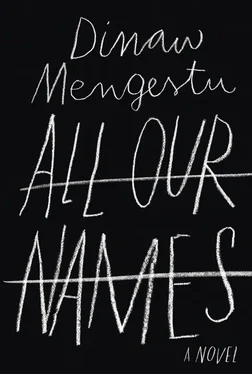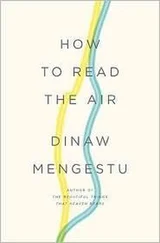As soon as he saw me he gestured for me to join him, as if inviting me into a circle of friends at a party where I was the stranger. That simple wave of the hand was all it took. I began walking to him before he had time to put his arm down. I walked past the soldiers, who formed a loose perimeter around the students, and never once did I feel afraid. Even at that early stage, the power in numbers was staggering. The crowd parted to let me through; I turned back once so I could see it close ranks behind me. It wasn’t how I had imagined it, but once Isaac put his arm around me, and boys I had never met slapped me on the back, I became a student at the university.
During the thirty-six hours the grounds were occupied, not one sign went up. We had no chants, and the few songs we sang were those that had been popular in the years just before independence. The revolutionary songs from the late 1950s and 1960s were everyone’s favorites, the songs of our parents and of our childhood, which we might have scorned at one time, but which we sang throughout the night to keep from falling asleep. The generation before us had had their revolution, and look what they had done with it. Over the course of the evening, I heard more than one student say that we were going to finish what our parents had started. There was the standard talk of a new African utopia, of a borderless and free continent. The students from the two opposing communist camps had their arms draped around one another, and at various times draped around Isaac and me as well.
“Look how happy they are,” Isaac whispered to me. I zoomed in on the boys at the end of the chain. They had the clothes and hair that came with privilege, but what I noticed most was the sheer, unrestrained joy that was on all their faces. They seemed incapable of closing their mouths.
It wasn’t until the first traces of sunlight began to emerge that I finally thought to ask Isaac what had happened to bring so many students together like this. None had left, but it was easy to see their resolve weakening. The songs had ended in the middle of the night, and everywhere I turned I saw eyes blighted not just by fatigue but by doubt. The party had gone on long enough for them, and what they sought wasn’t a renewal of their convictions, but a quick and, they hoped, painless exit from them. Isaac was one of the few who showed no signs of wear; it was, after all, his party to begin with.
Before I could think about what I wanted to say to him, I found myself looking up, along with Isaac and the two other boys nearest us, at the trail of smoke that had already peaked and was beginning to make its descent. The one thought I remember clearly before the canister burst several feet short of us was “I wonder if Isaac is going to tell us to run.” We were among the few who had seen tear gas fired before and knew how to respond. Long before the massing of soldiers around our slum, most protests in the poorest neighborhoods ended this way.
Isaac and I were the only two who moved deliberately in the opposite direction of the wind; the rest of the students simply ran, not knowing what they were up against or what to expect. Isaac had no intention of leading any of them to safety, and so dozens ran with eyes closed through the smoke, running first into one another and then, eventually, into the soldiers, who had pulled out their batons and were whipping the blind as they stumbled out of the mist. Isaac and I held our breath and were clear of the crowd in a few minutes. I followed him through a side door in one of the buildings, maybe the only door near us that wasn’t locked. We climbed to the second floor and, for the second time, I found myself in a classroom at the university — a science lab of six long tables and metal stools that looked directly onto the circle we had just left. From there we watched soldiers dressed in riot gear leisurely whip their way through the crowd. From the students left lying on the ground, a handful of boys were dragged away; two had been standing next to Isaac; both had given long, rambling speeches the previous evening and undoubtedly made targets of themselves as a result.
I waited for Isaac to speak. I expected to him say something about how tragic and terrible it was to see the boys we had just spent the night with beaten and taken away like that; those boys would have expected at least as much from us, but whatever pity I tried to find for them was forced, and I knew the same would have been true for Isaac, who, like me, felt almost grateful to the uniformed men for leveling the differences between our lives in the slums and those on the campus, with each blow they struck.
“It’s about time,” Isaac said. “I was beginning to think they’d never come. I was almost afraid they’d run out of gas.”
“I don’t think that’s possible,” I said. “At least, not anymore.”
I followed him to the windows.
“I heard there was a tank in our neighborhood.”
“No tanks,” I said. “At least not near us.”
“They’ll come,” he said. “It’s not even a question anymore.”
He spoke with the certainty of someone who’d drawn the battle plans himself.
“Where have you been sleeping?” I asked him.
“For the past two days, here.”
“On campus.”
“In this room. Under the table all the way in the back.” Isaac walked to the cupboards that lined one of the walls and pulled from one a thin roll-away mattress and a duffel bag full of clothes so I could see how he’d been living.
“No one uses this room. The lights don’t even work anymore. There are a dozen others like it on campus, but I have a key to this one.”
“Why this room?”
“Because,” he said, “haven’t you noticed, it has the best view.”
That was all Isaac would tell me about how far in advance the protest had been planned. He wanted me to know that it wasn’t an accident, and that if anyone was at the center, it was him. Nothing he said hinted that there were others behind him, but it was clear that he wasn’t alone. The most visible mark of our poverty had always been the state of our clothes; the few pants and shirts we both had were used to begin with, and since we rarely had the means to have them washed, they were that much the worse for wear. The clothes in that duffel bag and the ones Isaac was wearing, however, had never been touched; a set of white-and-blue shirts were neatly stacked in one corner of the bag, with a set of identical khaki pants like the ones Isaac was wearing next to them; it was the standard uniform for many of the boys at the university. I saw the clothes only briefly, but Isaac knew that their impression on me would last, and that when I left him I would do so wondering who had lavished such attention on him.
We spent the rest of the morning and the afternoon in the abandoned science lab. “You have to wait until it’s safe to leave,” he told me. “No one can see you walk out.”
If he hadn’t said that, I would have asked to stay longer anyway. I felt safe in that room, because Isaac was there and because I had always believed that one of the hidden benefits of being a student at the university was that it gave you a vantage point from which you could gaze upon the world without being injured. I watched the smoke disappear and the soldiers and police pick through the remains left behind by the students. I saw them gather coats, sweaters, and school bags; a red purse was lifted from the ground by one of the soldiers with the barrel of his gun and was swung in circles so the others could see his find. There were maybe a dozen students too injured to move; most sat slumped against trees, and a few lay flat on the ground. I didn’t expect anyone to tend to them, but I stared at them for over an hour just to make sure. The last student who was taken away was a young girl in a black skirt that was cut just above her knees. I told myself she was too short, and her skin the wrong shade of black, to be Patience. The men who carried her away were in uniform. She was the only one I felt genuine, unrestrained pity for: unlike that of the others, her suffering had just begun.
Читать дальше












